XMAR: Is the Shipping Industry Prepared to Embrace AI and Data-Driven Decision-Making?
For many years, while other sectors have undergone digital transformation, the shipping industry has continued to rely heavily on email chains, phone calls, and gut feelings. However, AI and data-driven decision-making are now beginning to challenge the traditional way of doing things, prompting companies to reconsider their operational strategies.

Some shipowners and operators view AI as just a buzzword. Others see it as an existential threat. The truth is that AI is neither magical nor a job eliminator. It is a tool that can bring much-needed logic, transparency, and efficiency to an industry that has long been based on relationships and intuition rather than data.
The Issue: Decisions based on Instinct Rather Than Intelligence
The shipping industry has never been data-centric. Chartering managers, bunker buyers, and fleet operators make multi-million dollar decisions on a daily basis, often without access to real-time data or historical benchmarking.
For instance, a bunker procurement manager might purchase fuel based on a few WhatsApp quotes, comparing the offers in their head rather than through a structured system. An operator might adjust a ship's speed based on personal experience rather than predictive analytics. A charterer might choose a fixture based on the strength of their broker relationship rather than solid market data.
These decisions are not necessarily wrong; they are the best decisions that can be made with the information available. But this is precisely the problem. Too many critical decisions are still being made with incomplete, outdated, or biased information.
AI Is Proving Its Worth
AI is not a futuristic concept; it is already demonstrating its value in the shipping industry. Some of the most forward-thinking companies are using AI-driven routing models to reduce fuel consumption, optimize speed, and avoid congestion. Others are applying machine learning to detect vessel performance anomalies before they lead to costly breakdowns.
Take predictive maintenance as an example. By analyzing engine performance and historical failure patterns, AI can inform shipowners when a part is likely to fail, well before it becomes a problem. This is not a hypothetical scenario. Maersk, for example, has been using AI to reduce unplanned maintenance and improve vessel uptime.
Another clear application is AI in chartering. Today, a human broker or charterer has access to only a fraction of the data that AI can process in seconds. AI tools can scan thousands of past fixtures, market conditions, and vessel positions, highlighting optimal deals that might have been missed in a manual search.
Why Adoption Is Slow
If AI is so effective, why isn't every shipping company using it? The biggest barrier is not the technology itself but the mindset. Many decision-makers are skeptical, viewing AI as a black box rather than a reliable tool. Others are resistant to changing a system that has worked for them for years.
There is also the data problem. AI is only as good as the data it is trained on, and many shipping companies still rely on fragmented, inconsistent, or inaccurate data. A 2022 survey by Splash247 found that 68% of shipping executives rated their internal data management as "poor" or "very poor." Without clean, structured data, AI cannot provide reliable insights.
Let's be honest, there is also resistance because AI threatens the status quo. A charterer who has built their career on instinct may not want to be told that a machine can do their job better. A bunker trader who thrives on personal relationships may not want full price transparency to erode their margins.
The Companies That Embrace AI Will Succeed
Despite the resistance, AI adoption is not a matter of if but when. The companies that embrace AI now will gain a competitive edge, reducing costs, improving efficiency, and making smarter decisions.
The best examples of AI adoption in shipping are not about replacing humans but empowering them. AI does not eliminate the need for experienced operators or traders; instead, it provides them with better tools to make better decisions. The smartest companies are not asking, "Will AI replace my team?" but "How can my team use AI to be 10 times more effective?"
As regulations become more stringent, margins shrink, and competition intensifies, the companies that embrace data-driven decision-making will outperform those that rely on outdated methods. AI is not here to replace people; it is here to replace inefficiency. The only question is whether the industry is ready to accept it.
Platforms like XMAR are already demonstrating that AI and data-driven decision-making can transform bunker buying. By providing full price transparency, structured negotiations, and real-time insights, XMAR is helping shipping companies move away from outdated processes and toward smarter, more strategic fuel purchasing.


